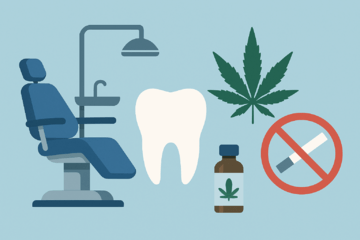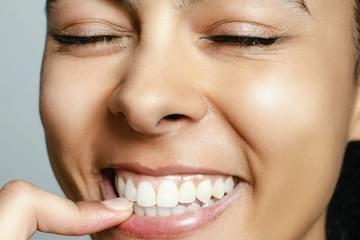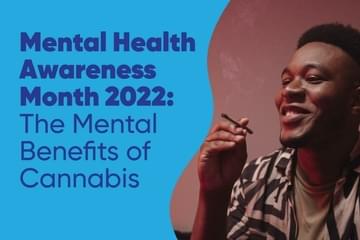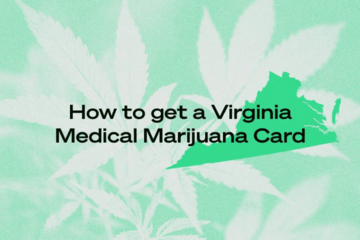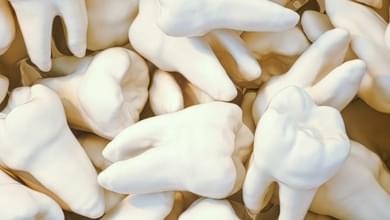
Everything A Stoner Needs To Know About Wisdom Teeth Removal & Smoking
Published on 9/29/22
Getting dental work done is never fun. It's hard enough to get some folks to show up for basic check-ups and such without them breaking out in stress-induced hives, let alone the idea of actually getting numbed up and worked on. And when you wait too long on that dull, nagging right in the corner of your jaw that you have trouble touching with your finger, let alone your toothbrush, you're bound to hear some troubling news from the dentist. You're going to need to get some teeth pulled. And not just any teeth. Your wisdom teeth!
If this sounds familiar, you're more than likely one of the five million folks per year who get their wisdom teeth surgically removed. While it's a minor procedure for some, others have to disrupt their usual routines to deal with the healing process. For many here in the U.S., that means they'll find themselves wondering something along the lines of "is smoking after wisdom teeth removal a good idea?" sometime between the age of 17 and 25.
However, figuring out the balance between removing wisdom teeth and smoking weed shouldn't be rocket science. After all, medical cannabis and high THC products can help you take the edge off painful qualifying conditions, right? So why can't you do a little bit of puffing, passing, and smoking weed after wisdom teeth removal? Don't worry, my likely sore and loopy friend, in this article, we're going to break down important details like how long after wisdom teeth can you smoke and how to safely go about smoking after wisdom teeth removal.
Thank us later for saving you the embarrassing search engine history!
What are Wisdom Teeth and Why Do They Need to Come Out?
Before we dig in too deep into the idea of how and why your smoking habits should change after wisdom teeth removal, let's first go into a little bit more of a background on what exactly wisdom teeth are and why they need to come out of your mouth in the first place. After all, all of your other teeth probably came in fine. So what makes these wisdom teeth so special?
So here's a quick rundown of all the crucial details you'll need to know about wisdom teeth.
Also known as our third molars, the wisdom teeth are often the last adult teeth to develop and come to the surface. Typically they'll come in between the age of 17 to 25, ripping through the gums at the back of the mouth on both sides of the top and bottom jaw.
Now here comes the tricky part. For those whose wisdom teeth grow in normally, they'll be fine. While the process of the teeth growing through the gums will be a little tender for a while, they'll get either no benefits or advantages for having their wisdom teeth aside from a few extra teeth to chew with.
For those whose wisdom teeth grow in incorrectly, however, those extra molars can cause many issues. Those teeth growing in incorrectly are known as impacted wisdom teeth and, according to the Mayo Clinic, could be problematic in the following ways:
An impacted wisdom tooth may:
- Grow at an angle toward the next tooth (second molar)
- Grow at an angle toward the back of the mouth
- Grow at a right angle to the other teeth, as if the wisdom tooth is "lying down" within the jawbone
- Grow straight up or down like other teeth but stay trapped within the jawbone
So how do you avoid impacted wisdom teeth and the issues they might cause? You get them removed before they can cause any trouble!
The Basics of Wisdom Teeth and Smoking
 Unsplash
UnsplashWe here at Where's Weed fully subscribe to the concept of nuance. While folks often try to box one another into rhetorical black and whites boxes when it comes to stuff, the truth actually exists a little bit closer to a shade of grey. On the topic of wisdom teeth/smoking, however, we're FIRMLY digging our heels in and stating with as little wiggle room as possible that you should not smoke for a bit either before or after wisdom tooth removal surgery.
There's a scorching hot take for you! Let's break down why we feel this way.
Firstly, you just had oral surgery. While it's true that it's probably considered minor surgery, it was still a whole surgery! Your cells need to recover and heal. Otherwise, the process will be more prolonged, painful, and unnecessarily drawn out than it needs to be.
Smoking anything already isn't great for your teeth and lungs to start with, so cutting back for a bit while the open wounds in your mouth heal is probably a solid idea.
Smoking shortly after surgery could lead to excess bleeding, irreversible nerve damage, blood/bone infections that can spread throughout the body, and even an incredibly painful condition called dry socket that you'll need to wait to resolve itself once to elevate the pain.
While it's true that all of that examples are a bit extreme, they're all made exponentially more likely by smoking after surgery. The Reagans were right about this one. After the wisdom teeth removal, just say no to drugs.
Before Your Wisdom Tooth Removal
While it's inarguable that smoking weed and wisdom teeth shouldn't fix after the fact, you should likely refrain from puffing, passing, and enjoying some cannabis for up to five days BEFORE your operation. This is important for a few key reasons.
Your oral health matters, especially when you're getting some kind of oral surgery. If you have healthy teeth, gums, and such, you'll heal fast with fewer risks after the surgery. Your mouth will be a cleaner, more hospitable place for those gums to heal.
Another factor to consider is that while it's true that cannabis can soothe and settle your nerve before surgery, especially one you're rather nervous about, those cannabinoids in your system might mess with the painkiller or antibiotics they're going to give you. You won't want those painkillers not working for an oral surgery where they're digging into your jawbone. Trust us on this one.
Are There Any Practical Alternatives to Smoking?
While you might not be able to smoke a bowl, light up a joint, or take some gnarly dab rig hits, you have some options for taking the edge off, chilling out, and riding high after wisdom teeth.
Infused beverages are a great idea as long as you're careful not to drink them out of straws, tinctures are super simple to dose and use without interrupting your healing process, and topicals would be fine as well. We would avoid putting the liquid cannabis products near the holes in your mouth, preferably following the doctor/surgeon's orders in terms of cleaning and care for the stitches.
So, to be clear, you don't need to drop cannabis cold turkey after getting oral surgery. You should avoid smoking it if/whenever possible while healing your mouth!
So How Long is Long Enough After Surgery?
While everyone's healing process is unique and different, the general rule of thumb for smoking after any oral surgery is to wait for about three full days afterward before even trying it. If that feels right, then go ahead and run with that. If you're more comfortable waiting a bit longer, we support that too. To be clear, we're on the side of going longer, not shorter, but the shortest time span you can probably spend before sparking up should be about three days.
This includes disposables, dab rigs, bongs, joints, blunts, water pipes, nectar collectors, and pretty much any other handheld smoking device as well! Keep the smoke and debris out of your mouth and clean those wounds, so they heal better and faster. The fast and better they heal, the sooner you can get back to enjoying your smokes as usual.
Just make sure to consult with your doctor about this, and remember to be honest and as transparent as possible. The only way your doctors can give you the correct information is if you're fully honest with them. Otherwise, they're basically trying to pin the tail on a donkey they can't see.
The Bottom Line
Being forced to stop smoking or using cannabis abruptly for any period of time can be a challenge for some, but it's FAR from impossible. Making this small change before and after your surgery will be worth it in the long run when you heal up faster and get back to smoking and enjoying some smokeable weed of your own!
Just make sure that you consult with your doctors/surgeons on everything. Having a helpful medical professional in your corner will go a long way to helping make sure you make the best possible decision for both your short-term mental and long-term physical health!









